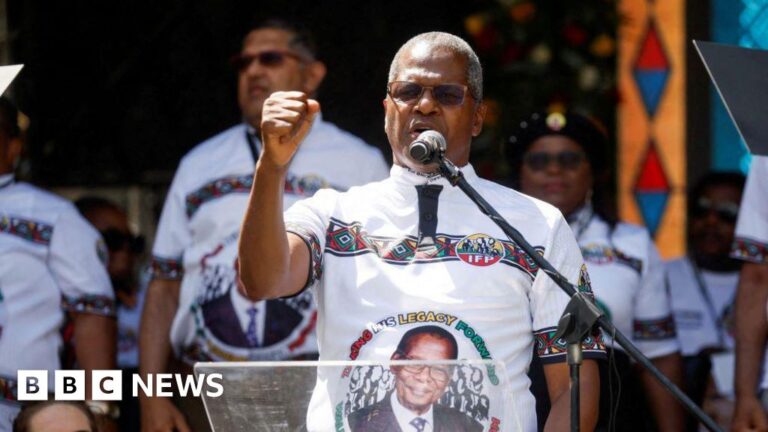- author, Danai Nesta Kupemba
- role, BBC News
-
The leader of South Africa’s Inkatha Freedom Party (IFP) says the party has agreed to join a national unity government that would also include the African National Congress (ANC) and the main opposition Democratic Alliance (DA).
“I only had a choice: join the government or join the opposition,” Belenkosini Hlabisa told reporters at a press conference in Durban on Wednesday.
“South Africans who voted are saying that political parties have to find common ground,” Hlabisa said.
South Africans have been eagerly waiting to see who will form the next government after the ANC lost its majority in last month’s general election.
Although the DA and ANC are yet to comment, this is the first official indication that a government of national unity has been agreed.
The ANC has previously said it wants to form a unity government and has been in negotiations with all the country’s opposition parties.
The new parliament is due to be sworn in on Friday after the Supreme Court rejected a petition by former president Jacob Zuma’s party to halt the first session.
Parliament is due to elect a president at this time and the ANC hopes an agreement can be reached by then. The ANC insists that Cyril Ramaphosa must remain the country’s leader.
The ANC’s vote share fell below 50 percent for the first time since Nelson Mandela led it to victory in 1994 and ended the racially discriminatory apartheid system, forcing it to search for a coalition partner.
The ANC won about 40% of the vote, the centre-right Democratic Alliance (DA) 22%, the MK Party 15% and the radical Economic Freedom Fighters 9%.
The IFP, a conservative party with a strong Zulu base, won about 4% of the vote in the election.
Many ANC activists want a deal with the EFF and MK, which are led by former ANC officials.
But such a coalition would likely wary investors because the parties support the expropriation of white-owned land without compensation and the nationalization of the country’s mines.
The business community would prefer an ANC-DA coalition government.
Bringing other parties such as the IFP on board would help the ANC leadership fend off criticism that it is “betraying” the party by working with the DA, which some South Africans see as representing the country’s white minority.
The DA opposes two core ANC policies: the Black Empowerment Programme, which aims to give black people the right to participate in the economy after being excluded under apartheid, and the National Health Insurance (NHI) Bill, which promises universal health coverage for all.
“We are in this unity government for the country and for the people, who want to continue living with a stable government that will address their challenges,” Hlabisa said.
Hlabisa assured IFP supporters that the party “will not lose its identity” as it has worked in coalition governments in the past.
After historic elections in 1994, Mandela’s ANC aligned itself with its former foes in the apartheid National Party and the IFP, whose supporters frequently clashed with ANC activists, leaving thousands dead.
Image source, Getty Images/BBC

